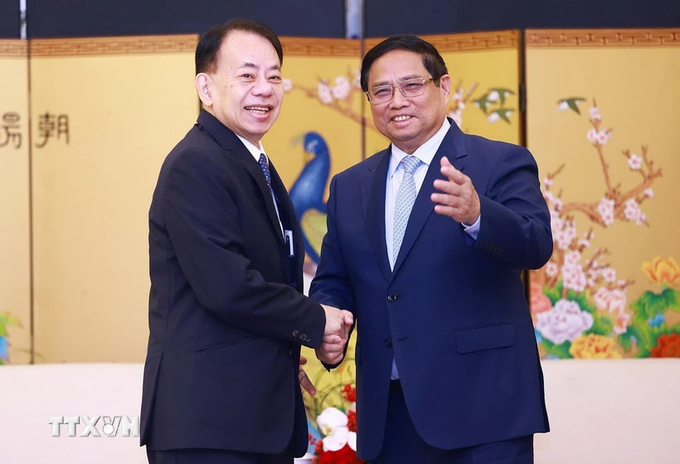November 25, 2025 | 15:08 GMT +7
November 25, 2025 | 15:08 GMT +7
Hotline: 0913.378.918
November 25, 2025 | 15:08 GMT +7
Hotline: 0913.378.918

Prime Minister Pham Minh Chinh proposes ADB funding for anti-landslide projects. Photo: VNA.
During his attendance at the 8th Greater Mekong Subregion (GMS) Summit and a working visit to China, Prime Minister Pham Minh Chinh met with Asian Development Bank (ADB) President Masatsugu Asakawa on the morning of November 6 in Kunming.
During the meeting, Prime Minister Pham Minh Chinh expressed gratitude for ADB’s significant contributions to Vietnam’s socio-economic development and poverty reduction initiatives on behalf of the Vietnamese government and people.
President Asakawa extended his condolences to the Vietnamese people affected by Typhoon Yagi. He commended Vietnam’s prompt recovery efforts and encouraged the government to accelerate the disbursement of ADB funds to further advance development projects within the country.
The Prime Minister also thanked ADB for its strategic advice and support during Vietnam’s reform process, noting that timely and insightful assistance is crucial. He requested ADB's support for various transformational projects, including offshore wind power, standardized railways, urban rail systems, high-speed rail, and anti-landslide initiatives. He emphasized the importance of low-interest financing for these impactful, large-scale projects.
President Asakawa reaffirmed ADB’s commitment to partnering with Vietnam, sharing expertise, and providing policy support, particularly in macroeconomic, monetary, and fiscal policies to maintain key economic balances, control inflation, and drive growth aligned with Vietnam’s unique circumstances. He also expressed support for Vietnam’s efforts in sustainable development, including the growth of its green, digital, and circular economies, and enhancing the country’s economic competitiveness.
President Asakawa noted Vietnam’s strong potential for private sector growth, highlighting ADB’s efforts to facilitate low-interest loans for countries to help mitigate climate change effects, an area in which Vietnam stands to benefit.
Translated by Quynh Chi

(VAN) In addition to strengthening the relationship between schools and enterprises, the Aus4Skills project expands opportunities for female students and people with disabilities to work in the transport and logistics sector.

(VAN) Nghe An is preparing policy, technical, and resource steps to participate in the forest carbon credit market.
/2025/11/25/1648-2-110733_532.jpg)
(VAN) From 2011 to 2023, Ca Mau province lost approximately 6,200 ha of coastal land and protection forests due to erosion, threatening many residential areas, infrastructure facilities, and production zones.

(VAN) Quang Ngai holds strong potential for carbon credits but needs a clear legal and policy framework to secure sustainable revenue from this resource.

(VAN) With its diverse ecosystem, Phu Quoc National Park plays a vital role in environmental protection and biodiversity conservation and serves as the core zone of the Kien Giang World Biosphere Reserve.

(VAN) Cooperation activities under the Aus4Skills program focus on: logistics professional development, competency-based training and assessment (CBTA), leadership innovation, and digitalization.

(VAN) Minister Tran Duc Thang has affirmed that the models developed by Que Lam Group serve as a practical foundation for the Ministry of Agriculture and Environment to direct wide-scale replication.